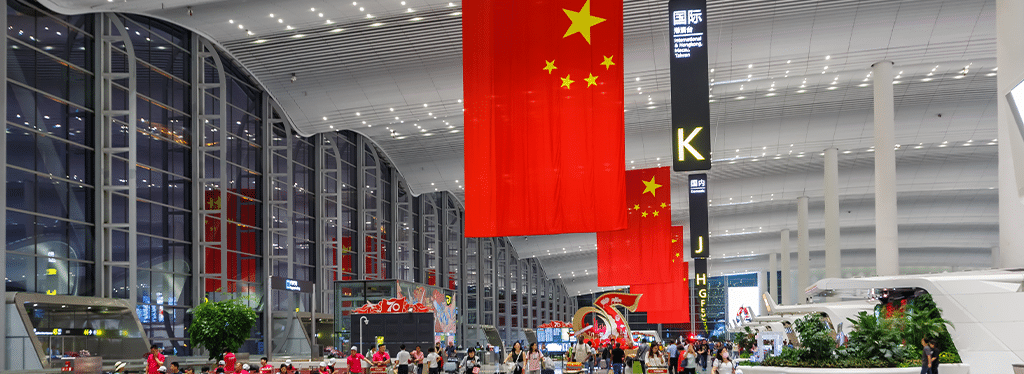
China’s Long-awaited COVID-19 Reopening
China’s borders have largely been shut to international travelers since March 2020, and now after three years, as of January 8th, China has eased restrictions by removing the quarantine requirement. The only requirement that is in place to enter is that travelers will need proof of a negative PCR result within 48 hours before their departure.
This has been a typical requirement for other countries upon allowing travelers to enter their country post-COVID-19 and remains in effect for some. China has also restarted its Visa-free policy. This will mean that if you qualify for the Visa-free transit policy you can travel into China without applying for a new Visa. This change will open the borders to both leisure and business travelers – including relocating employees on assignment.
This is welcome news to the global mobility community. With this easing of restrictions, companies could look at China as a key growth opportunity. With the rest of the world facing inflation and potential economic recession, business growth and continuity in China are becoming more critical than before. This should lead to more movement into China, especially for companies that are already well established in the country but had to limit their mobility programs due to the previous COVID-19 restrictions. Companies may now also have a less challenging time convincing expatriates to accept assignments in China.
The easing of restrictions on China’s border also allows movement from China to other parts of the world. Although many other countries, including the European Union, may still be imposing additional measures such as pre-flight testing for travelers coming from China due to a recent spike in COVID-19 cases, the opening of borders will undoubtedly allow the Chinese people to travel again, for both leisure and business. With China easing restrictions, we would expect to see an increase in movements from the country to other parts of the world, especially Europe, where many Chinese multinationals are expanding into. With the previous restrictions, Chinese nationals were finding it tough to fly out of the country for business but that now seems to be a non-issue.
However, not all countries are making accommodations for China’s new policies. South Korea and Japan, two top destinations for Chinese travelers, said they will not be increasing flights to China in response to its borders reopening. In response to this, China’s embassies in South Korea and Japan announced that they will stop issuing visas to Korean nationals and Japanese citizens. China is also imposing restrictions on travelers from other countries with travel restrictions against Chinese citizens.
If you would like more information on the situation in China, please contact your Altair Global Client Services of Business Development representative or reach out to us at [email protected].
Share This Story, Choose Your Platform!
China’s borders have largely been shut to international travelers since March 2020, and now after three years, as of January 8th, China has eased restrictions by removing the quarantine requirement. The only requirement that is in place to enter is that travelers will need proof of a negative PCR result within 48 hours before their departure.
This has been a typical requirement for other countries upon allowing travelers to enter their country post-COVID-19 and remains in effect for some. China has also restarted its Visa-free policy. This will mean that if you qualify for the Visa-free transit policy you can travel into China without applying for a new Visa. This change will open the borders to both leisure and business travelers – including relocating employees on assignment.
This is welcome news to the global mobility community. With this easing of restrictions, companies could look at China as a key growth opportunity. With the rest of the world facing inflation and potential economic recession, business growth and continuity in China are becoming more critical than before. This should lead to more movement into China, especially for companies that are already well established in the country but had to limit their mobility programs due to the previous COVID-19 restrictions. Companies may now also have a less challenging time convincing expatriates to accept assignments in China.
The easing of restrictions on China’s border also allows movement from China to other parts of the world. Although many other countries, including the European Union, may still be imposing additional measures such as pre-flight testing for travelers coming from China due to a recent spike in COVID-19 cases, the opening of borders will undoubtedly allow the Chinese people to travel again, for both leisure and business. With China easing restrictions, we would expect to see an increase in movements from the country to other parts of the world, especially Europe, where many Chinese multinationals are expanding into. With the previous restrictions, Chinese nationals were finding it tough to fly out of the country for business but that now seems to be a non-issue.
However, not all countries are making accommodations for China’s new policies. South Korea and Japan, two top destinations for Chinese travelers, said they will not be increasing flights to China in response to its borders reopening. In response to this, China’s embassies in South Korea and Japan announced that they will stop issuing visas to Korean nationals and Japanese citizens. China is also imposing restrictions on travelers from other countries with travel restrictions against Chinese citizens.
If you would like more information on the situation in China, please contact your Altair Global Client Services of Business Development representative or reach out to us at [email protected].



![China’s Long-awaited COVID-19 Reopening 7 [GUIDE] Local Plus Policy Considerations](https://www.altairglobal.com/wp-content/uploads/2024/12/GCS-Thought-Leadership-Blog-Header-Image-500x383.png)



